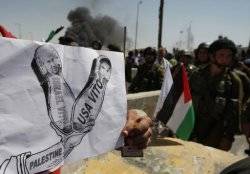Netanyahu: Nuclear-armed Iran must be stopped
06/03/2012| IslamWeb
Binyamin Netanyahu, Israel's prime minister, has stated his country's right to defend itself against the possible threat of a nuclear-armed Iran and said the world cannot wait for much longer to take action against Tehran.
Netanyahu was addressing the American Israel Public Affairs Committee (AIPAC), the powerful pro-Israel lobbying group, in Washington on Monday, after earlier holding talks with US President Barack Obama.
"Israel will always reserve the right to defend itself," Netanyahu said. "We leave all options on the table and containment is not an option. The Jewish state will not allow those who seek Israel's destruction the means to achieve that goal. A nuclear-armed Iran must be stopped."
In an apparent retort to Obama's address to AIPAC a day earlier in which the US president called on Israel to allow time for US-led sanctions against Iran to take effect, Netanyahu said: "We've waited for diplomacy to work, we've waited for sanctions to work; none of us can afford to wait much longer."
Monday's meeting at the White House comes amid speculation, in the press and in public statements by Israeli officials, that Israel is planning a strike against nuclear facilities in Iran which it says aims to develop a nuclear device.
Netanyahu told AIPAC that he would not talk about what Israel would or would not do, but reiterated that Israel would not allow Iran to acquire nuclear weapons.
"None of us can afford to wait much longer," Netanyahu said. "As prime minister of Israel, I will never let my people live in the shadow of annihilation."
The Obama administration has not said whether it would support Israeli action against Iran, and in recent weeks has said it sees no evidence that Iran is building a nuclear weapon.
James Clapper, the US director of national intelligence, testified before Congress in January that he believed Iran had not yet decided whether or not to build a bomb.
Diplomacy
In his statement, Obama largely echoed points he made on Sunday night in his address to AIPAC.
Obama said that America "reserves all options" regarding Iran's nuclear programme, but wanted more time to pursue diplomacy.
"I know that both the prime minister and I prefer to resolve this diplomatically," he said. "We understand the costs of military action."
Al Jazeera's Patty Culhane, reporting from the AIPAC conference, called Netanyahu's address "an impassioned speech".
"It seemed at times he was actually mocking members of the Obama administration, saying amazingly some people still don't believe Iran is trying to develop a nuclear weapon,
"It's important to point out that the US intelligence agencies have repeatedly said that there is absolutely no evidence that Iran has decided that it wants to build a nuclear weapon," Culhane added.
Reporting from the Iranian capital Tehran, Al Jazeera's Dorsa Jabbari said: "[Iran's] position will not change based on this speech by the prime minister [Netanyahu]. Israel has always been public enemy number one in this country and this kind of rhetoric about Iran only serves this establishment's purpose.
"[Iran] believes this kind of talk will only strengthen their position and actually win over more people in the country in terms of aligning them together in standing united against one enemy.
"And this is the point president Obama made on Sunday as well - that there has been too much talk of war and it only serves the Iranian establishment when that happens," Jabbari said.
'Red lines'
Netanyahu's government, and AIPAC's leadership, wanted Obama to go further. The prime minister wants Obama to lay down "red lines" - a clear statement of when the US would attack Iran over its nuclear programme.
AIPAC, meanwhile, is circulating flyers which describe an Iran with even the capability to build nuclear weapons as "unacceptable."
AIPAC's position would call for a strike on Iran once its nuclear programme reached a certain point, even if the Iranian leadership was not actively building a nuclear weapon.
International negotiations over Iran's nuclear programme have been stalled for more than a year, but the Iranian government announced last month that it would be willing to resume talks without any preconditions.
Israeli officials want Iran to completely suspend its uranium enrichment programme before the West resumes negotiations.
However, the White House has apparently rejected that demand, which Iran would almost certainly refuse; Obama told AIPAC he still believed a diplomatic solution was possible.
AIPAC's annual conference holds particular importance in an election year in the US, with the group's members expected to fan out across Capitol Hill to pressure legislators in the lead-up to November's vote.
The Iranian nuclear programme has also become a key foreign policy issue in the US, where all of the Republican presidential candidates have been sharply critical of Obama's approach to Tehran.
Mitt Romney, the former Massachusetts governor and frontrunner in the Republican primary race, told an audience shortly after Obama's speech that "if Barack Obama is re-elected, Iran will have a nuclear weapon". Three of the Republican candidates - Romney, Newt Gingrich and Rick Santorum - are scheduled to address the AIPAC conference on Tuesday.
PHOTO CAPTION
Netanyahu: 'I will never let my people live in the shadow of annihilation' [AFP]
Aljazeera

